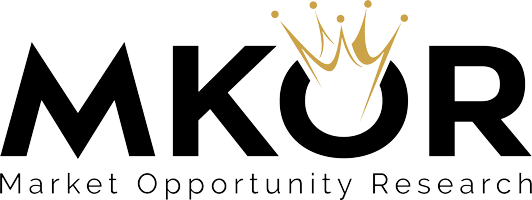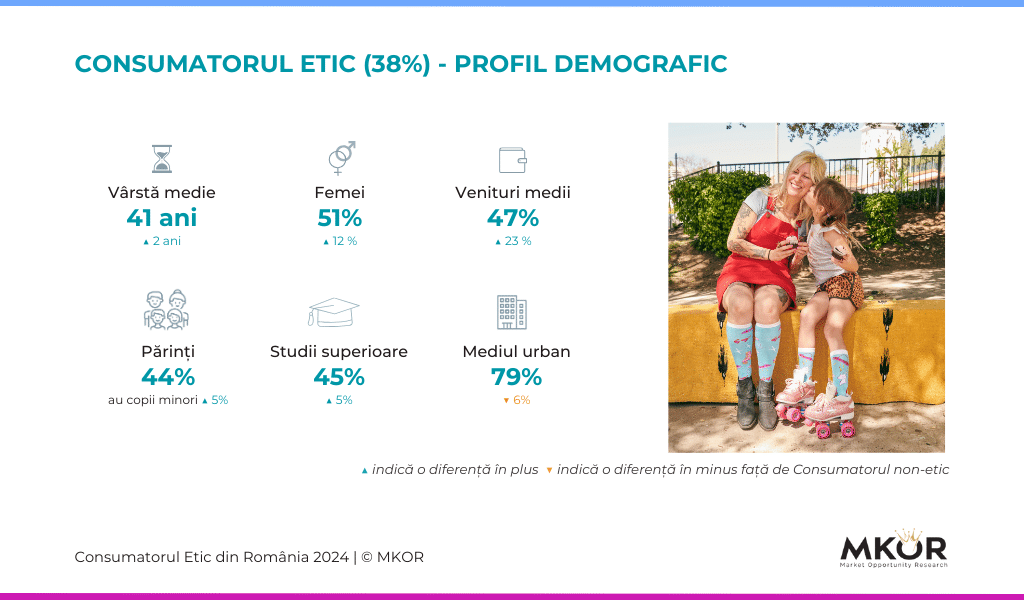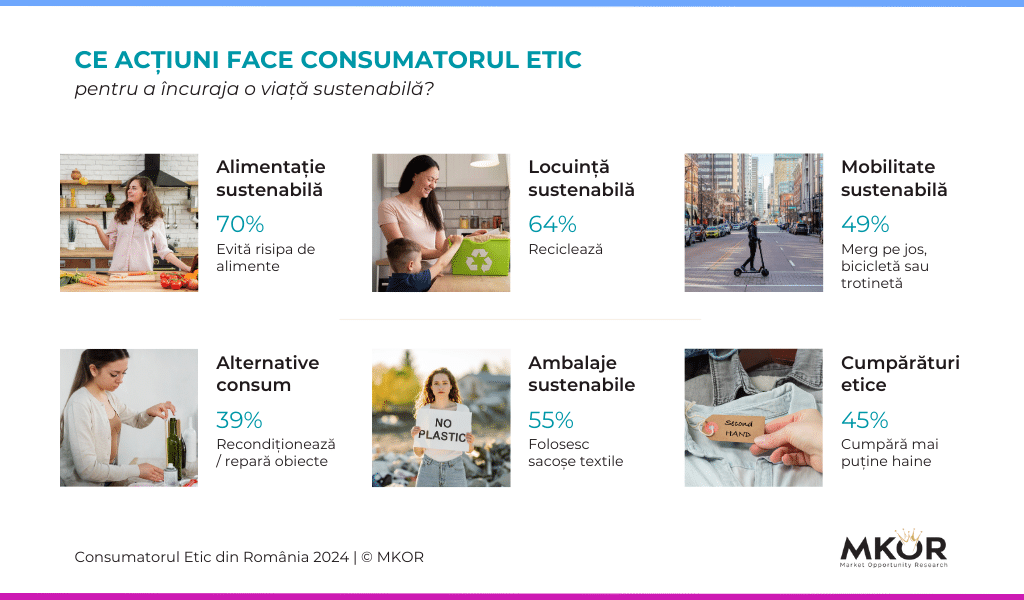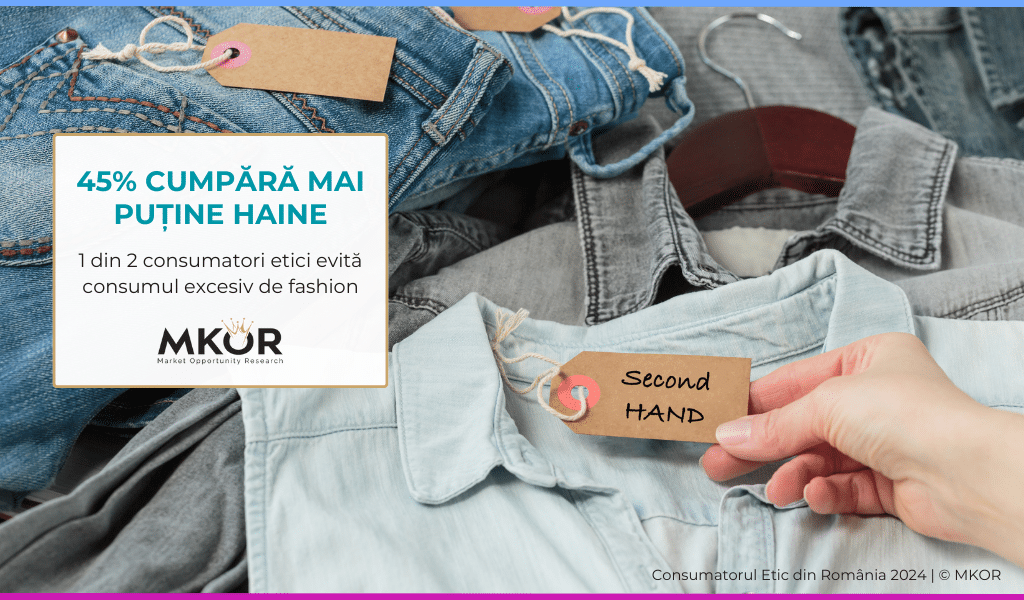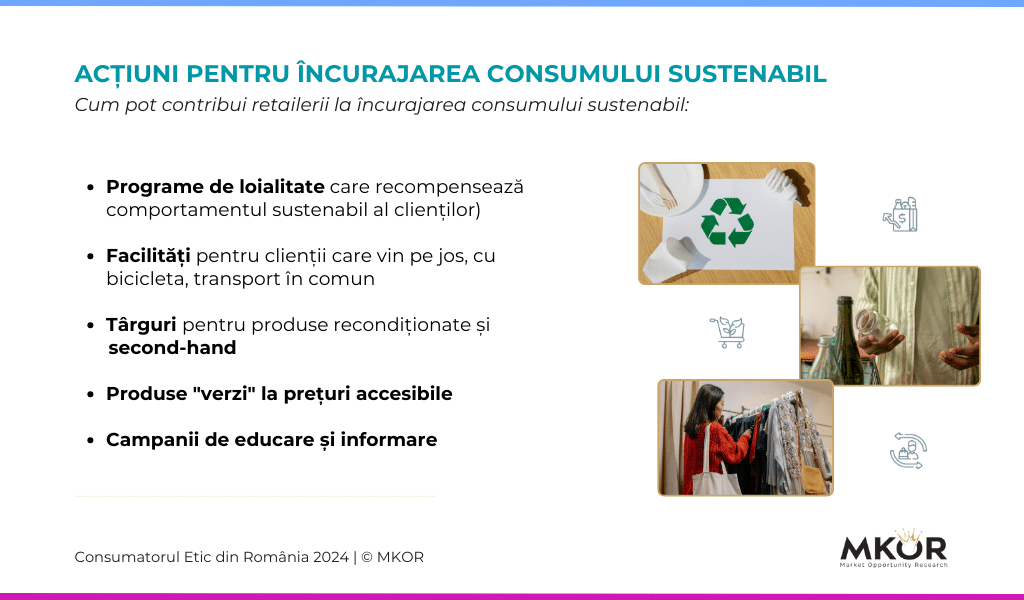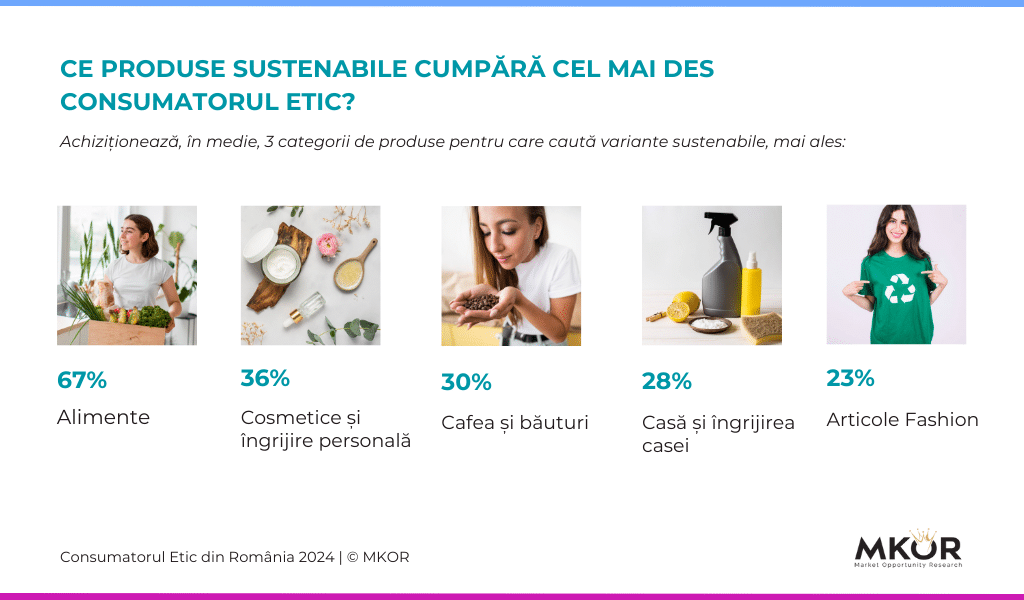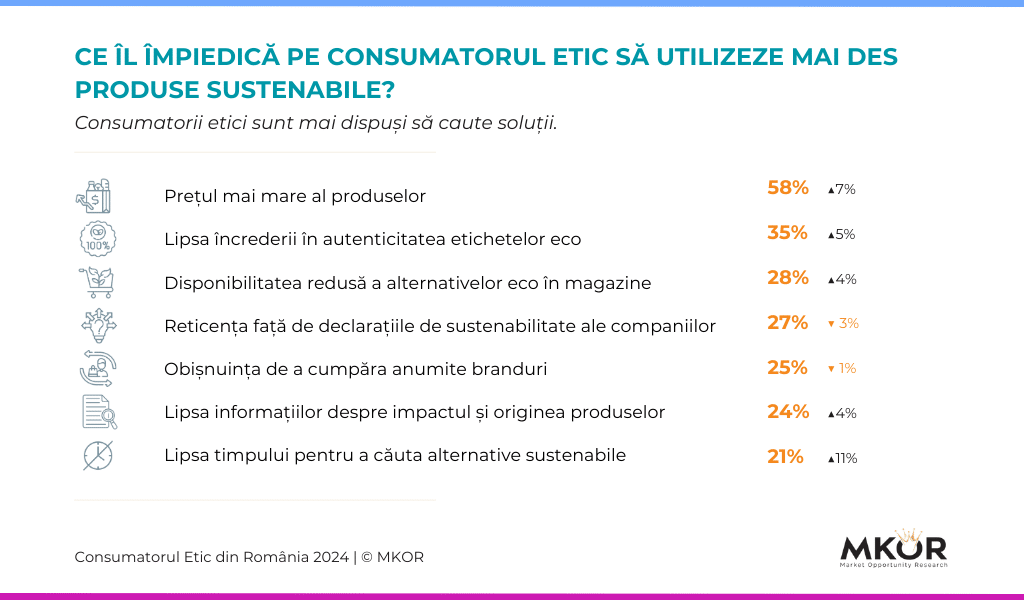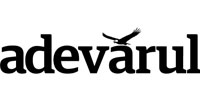The Ethical Consumer is a person who makes purchasing decisions based on social, ecological, and moral impact. This type of consumer is aware of the effects their purchases can have on the surrounding environment.
The Ethical Consumer seeks to support products and services that respect high standards of sustainability, social justice, and business ethics. By their choices of purchase and consumption, the Ethical Consumer expresses their concern for the welfare of the global community and assumes the responsibility to contribute to a more equitable and durable way of life.
![]()
Cori Cimpoca – Founder of MKOR
The study we conducted this year responds to the existing needs in the market to understand the expectations and consumption habits of people interested in sustainability.
The Ethical Consumer in 2024 (EC2024) bases its methodological approach on the two studies conducted in the past by MKOR, namely Ethical Consumer Behavior (2022) and Retail Trends regarding the Ethical Consumer (2021).
Conținut partea 2
MKOR CE2024: 38% of Romanians are attentive to the impact their consumption habits have on the environment, in a consciously and responsible manner
The MKOR study on consumption trends has revealed that 38% of Romanians consider the impact on the environment when purchasing different products and services.
The Ethical Consumer adopts an integrated approach when deciding on products and services to buy. In addition to environmental concerns, they choose products, brands, and retailers that promote values such as fairness, solidarity, and respect for others.
A significant percentage of 56% are more likely to be undecided, while only 3% declare that they are not interested in aspects related to sustainability and ethics in consumption.
![]() MKOR Recommendation 👇
MKOR Recommendation 👇
Indecisive consumers can be attracted to become Ethical Consumers through programs encouraging environmental protection, because:
- 4 out of 10 indecisive consumers contribute to environmental protection through daily actions;
- In a month, the indecisive consumer practices 5 sustainable activities, one less than the Ethical Consumer.
Full Access: Download the free "Ethical Consumer in Romania 2024" Report – and freely discover the study's findings.

What is the profile of the Ethical Consumer in Romania in 2024?
The Ethical Consumer tends to be a woman from the urban environment, belonging to the Millennials generation, with minor children (Nesters) and medium to low income, and has completed higher education.
These characteristics are easily justified in the context of the ethical consumer’s behavior. Generally, women show increased sensitivity to issues related to the environment, ethics, and health, and this concern is intensified by their role as mothers and the responsibility associated with caring for young children (44% of respondents fall into this category).
The higher education of this type of Ethical Consumer grants them access to detailed information regarding the consumer’s impact on the environment. Their medium income allows them to make purchases oriented towards products and services that adhere to high ethical standards, even if these are not the most financially accessible options.
Although the urban environment offers a wide range of options regarding available products and services, it is surprising to find that many Ethical Consumers are found in rural areas. Interestingly, one of the specific behaviors of the Ethical Consumer is cultivating their own plants (22%).
What actions does the Ethical Consumer take?
The Ethical Consumer is engaged and makes conscious, responsible decisions that better plan their daily life, from what they eat and purchase to how they travel and manage resources.
They:
- purchase products with ecological certification or those that correspond to their values (honesty, solidarity);
- exhibit altruistic behavior and avoid brands that indirectly exploit child labor;
- protect the environment through daily actions (recycling, reducing food waste, and minimizing the use of personal vehicles).
Individuals fitting the Ethical Consumer profile focus on impactful actions that do not require significant financial investment or time:
70% avoid food waste. The Ethical Consumer is 1.5 times more aware than their non-ethical counterpart of the environmental impact of their food consumption habits and strives to purchase only what is needed. Some respondents prefer to buy products close to their expiration date.
64% recycle. Separate waste collection is part of the routine for Ethical Consumers. They choose energy-efficient products with care for the environment, understanding that the initial investment can be offset by long-term cost savings.
49% walk or use bicycles/scooters. Nearly half of Ethical Consumers choose alternatives to car transportation, twice as likely compared to those less interested in sustainability.
39% recondition/repair items. Repairing goods is a practice more common among men, making up a significant portion of this category. Women, on the other hand, are more inclined to use second-hand services and product sharing through rental or borrowing, a niche market for consumers, regardless of ethical concerns.
55% use textile bags. Rejecting plastic or paper bags in favor of textile bags is a choice that reinforces the stance of purchased products as a declaration of support—Female, 21 years old.
45% buy fewer clothes. 1 in 2 Ethical Consumers avoids the excessive consumption of fashion. The preference for natural products, although less widespread, is much more pronounced among consumers who make ethical choices (25% of them).
![]() MKOR Recommendation 👇
MKOR Recommendation 👇
Retailers can also contribute to encouraging sustainable consumption through small actions such as:
- Loyalty programs that reward sustainable behavior of customers (e.g., points for reusable bags).
- Facilities for customers who come by foot, bike, or public transport.
- Markets for reconditioned and second-hand products.
- “Green” products under their own brand at affordable prices.
- Education and information campaigns: Recipes and advice on how to use food leftovers; Initiatives for volunteer work and community involvement; Events, seminars on sustainability and ecology topics.
- Transparency and traceability regarding the origin of products.
Want to learn more about the Ethical Consumer in Romania?
Full Access: Download the free "Ethical Consumer in Romania 2024" Report – and uncover the study's results for free.
What sustainable products does the Ethical Consumer purchase most often?
Most frequently, the Ethical Consumer looks for sustainable variants for products in the following categories:
- Food, especially prioritized by those with higher education
- Cosmetics and personal care, with greater interest among women
- Coffee and beverages, more sought after by those with medium income
- Home and household care, prioritized by those with higher income
- Fashion items, chosen especially by Gen Z (18-26 years old)
What prevents the Ethical Consumer from using more sustainable products?
Certainly, there are numerous barriers that stand in the way of the ethical consumer when trying to make more sustainable choices. Among these are:
Higher product prices: Often, sustainable products are priced higher than similar conventional products, making them inaccessible to certain consumer segments.
Lack of trust in the authenticity of eco-labels: Consumers are frequently skeptical about the authenticity of eco-labels that indicate the eco-sustainable nature of a product, which can lead to hesitation in purchasing these products.
Limited availability of eco-friendly alternatives in stores: Many stores do not offer a wide range of sustainable products, making it challenging for consumers who wish to adopt a more eco-friendly lifestyle.
Reluctance due to companies’ sustainability claims: Many consumers are skeptical about the sustainability declarations made by companies.
Habit of purchasing certain brands: Consumers may be loyal to specific brands, even to the detriment of more sustainable options offered by other companies.
Lack of information about the impact and origin of products: Often, consumers do not have access to detailed information about the environmental impact and the origin of the raw materials used in product production, which prevents them from making informed choices.
Lack of drive to seek out sustainable alternatives: Consumers do not always have the necessary time to seek out sustainable alternatives or to investigate the products they purchase in detail.
These barriers represent significant challenges for consumers who wish to adopt a more sustainable lifestyle and require innovative approaches from producers, merchants, and other interested parties to overcome.
What motivates Ethical Consumers to be attentive to the products and services they purchase?
41% of respondents are interested in the health benefits and well-being when they purchase products and services.
39% are attentive to aspects related to sustainability and responsibility towards the environment.
Those with higher education and higher incomes are oriented towards encouraging local producers, and recycling is supported by 22% of respondents, being especially important for those with higher incomes.
Research Information
- Sample size: N=1000
- Sample characteristics: Nationally representative based on gender, age, and geographic distribution
- Target: The general population of Romania with ages ranging between 18 and 55 years old
- Research method: Opinion survey (CAWI)
- Instrument: Questionnaire
- Approach: Online, via the MKOR Consumer Panel
- Period: November 2023
MKOR is an innovative market research agency. We have been a part of the Romanian business ecosystem for 11 years. Our mission is to assist entrepreneurs with vision to reach their growth potential through the use of data. We believe that information collected directly from the market about consumers and their perceptions of brand offers a clearer picture of potential and sparks inspiration for the companies you work with. Agility and empathy in business are our superpowers.
Through our team, we combine practical business experience, MBA-level know-how, and market research expertise to better understand the analytical needs and other requirements of our clients. MKOR provides actionable information.
Follow us on social media (LinkedIn and Facebook) to stay in touch and to find out about business cases that are powered by numbers.
We can tailor your study to the specific needs of your company. With well-defined objectives, we can analyze:
- Consumer studies, including those that assess the consumer experience;
- Opportunity studies concerning market sizing and potential, product testing;
- Brand tracking studies;
- Studies on diversity and inclusion within your company;
- Studies on consumption habits through our interactive platform – Consumer Trends.Live.
Interested? Contact us and schedule a meeting with us.
In the Services section, you can read more about the types of studies we conduct. Also, take a look at our portfolio to see which clients we have worked with.
Appearances in the Press of the study
Full Access: Download the free "Ethical Consumer in Romania 2024" Report – and freely discover the study's findings.
Stay Updated with the Latest Market Trends
We at MKOR provide real-time data and consumer intelligence so that entrepreneurs and decision-makers in companies can understand market trends as they happen.
We invite you to subscribe to our newsletter to be among the first to find out when we publish key market data.
Descoperă Consumer Trends.Live
Platforma digitală pe care o folosim pentru a inova cercetarea de piață oferă:
- Actualizări lunare ale datelor
- Acces instantaneu la date
- Raportare interactivă, ușor de explorat
- Benchmarking pe baza datelor istorice (începând din mai 2021)
- Benchmarking de retail pentru principalii jucători
Accesul se face pe bază de abonament și analizează peste 150 de companii din retail din cele 7 domenii: IT%C, Îngrijire personală și cosmetice, Industria DIY, Electronice și electrocasnice, Bijuterii și ceasuri, precum și Mobilier și decorațiuni.
Magazinul Viitorului din Perspectiva Consumatorilor este bazat pe date direct de la consumatori din platforma Consumer Trends.Live.
Platforma poate fi explorată în cadrul unei sesiuni demo, alături de un consultant MKOR. În cadrul acestei sesiuni, sunt disponibile următoarele:
- Dashboardul Consumer Trends.Live
- Beneficiile platformei
- Recomandări pentru extragerea datelor necesare strategiei de business
Noi îți punem la dispoziție raportul Magazinul Viitorului în mod gratuit, iar la cerere îți dezvoltăm o analiză personalizată, adaptată nevoilor business-ului tău.
Analiza personalizată cuprinde benchmarking între industrie și principalii tăi competitori, la alegere.
Dacă reprezinți o companie din retail și îți dorești un studiu relevant pentru domeniul tău de activitate, ne poți contacta pentru a discuta detalii despre cum putem colabora.
Urmărește-ne pe Newsletter, comunicăm lucruri acționabile 👇
Have you read everything? Comment / join our newsletter / read our other research posts!
MKOR Consumer Sentiment Study: Principal Reasons for Romanian Concerns in 2023
April 16, 2024
0 Comments8 Minutes
How it went at the IQ Digital launch: the initiative supporting Romanian SMEs for free
January 24, 2026
0 Comments6 Minutes
Celebrating European Diversity Month by Giving a Voice to Employees in Romania
January 28, 2026
0 Comments8 Minutes
